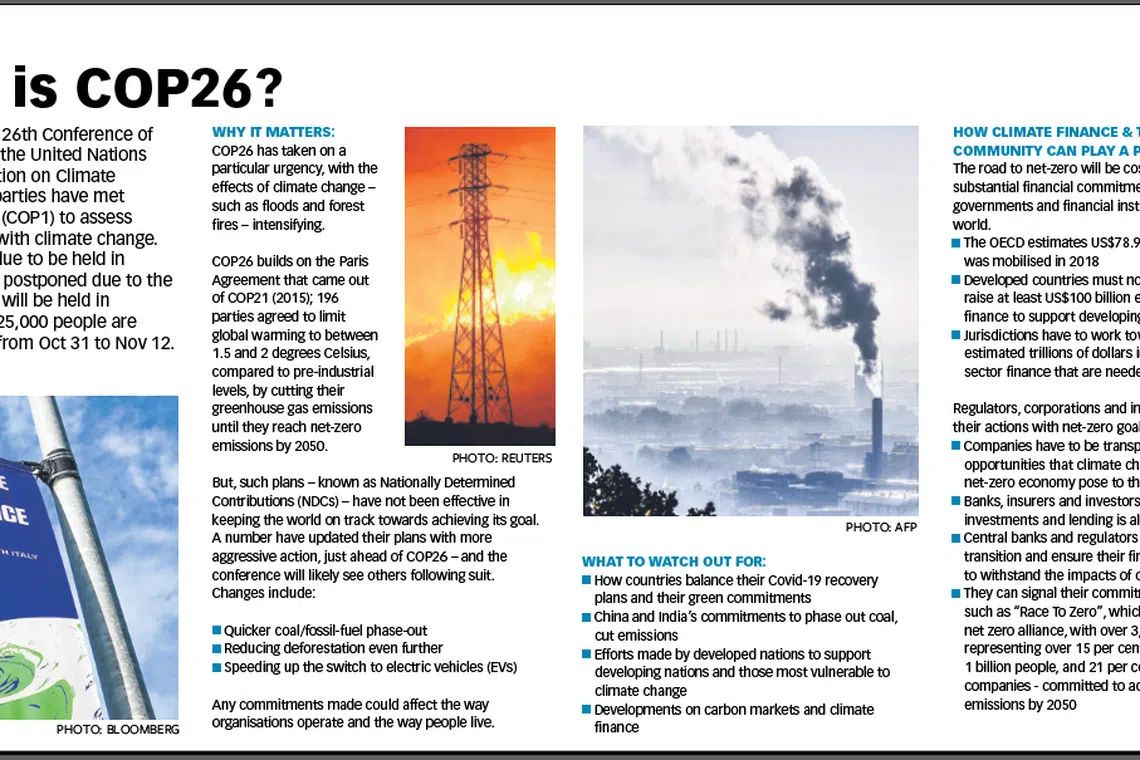BT Explains: What is COP26 and how will it affect you?

What it is:
COP26 refers to the 26th Conference of the Parties (COP) to the United Nations Framework Convention on Climate Change (UNFCCC). Parties have met annually since 1995 (COP1) to assess the progress in dealing with climate change.
COP26 will be held in Glasgow, in the United Kingdom, from Oct 31 to Nov 12. Some 25,000 people are expected to attend. It had originally been scheduled for November 2020 but was postponed due to the Covid-19 pandemic.
Why it matters:
COP26 has taken on a particular urgency, with the effects of climate change - such as floods and forest fires - intensifying.
COP26 builds on the Paris Agreement that came out of COP21 (2015); 196 parties had agreed to limit global warming to between 1.5 and 2 degrees Celsius, compared to pre-industrial levels, by cutting their greenhouse gas emissions until they reach net-zero emissions by 2050.
Navigate Asia in
a new global order
Get the insights delivered to your inbox.
The Paris Agreement is a legally binding agreement that works on a 5-year cycle of increasingly ambitious climate action carried out by signatories, that is, countries will have to make bigger emissions cuts each cycle until they reach net-zero.
But, such plans - known as Nationally Determined Contributions (NDCs) - have not been effective in keeping the world on track towards achieving its goal. A number have updated their plans with more aggressive action, just ahead of COP26 - and the conference will likely see others following suit. Changes include:
- Quicker coal/fossil-fuel phase-out
- Reducing deforestation even further
- Speeding up the switch to electric vehicles (EVs)
Any commitments made could affect the way organisations operate and the way people live.

What to watch out for:
- How countries balance their Covid-19 recovery plans and their green commitments
- China and India's commitments to phase out coal and cut emissions
- Efforts made by developed nations to support developing nations and those most vulnerable to climate change
- Developments on carbon markets and climate finance
How climate finance & the investing community can play a part:
The road to net-zero will be costly and require substantial financial commitment on the part of governments and financial institutions around the world.
The OECD has estimated that US$78.9 billion of climate finance was mobilised in 2018. Developed countries must now deliver on promises to raise at least US$100 billion every year in climate finance to support developing countries.
Jurisdictions will have to work towards releasing the estimated trillions of dollars in private and public sector finance that are needed.
Regulators, corporations and investors ought to align their actions with net-zero goals:
- Companies should be transparent about the risks and opportunities that climate change and the shift to a net-zero economy pose to their business;
- Banks, insurers and investors ought to ensure their investments and lending are aligned with net-zero goals;
- Central banks and regulators should support the transition and ensure their financial systems are able to withstand the impacts of climate change
- Parties can signal their commitment through alliances such as "Race To Zero" committed to achieving net-zero emissions by 2050. "Race To Zero", which is the world's largest net zero alliance, has over 3,800 members, representing over 15 per cent of the global economy, 1 billion people, and 21 per cent of the world's biggest companies.
Decoding Asia newsletter: your guide to navigating Asia in a new global order. Sign up here to get Decoding Asia newsletter. Delivered to your inbox. Free.
Copyright SPH Media. All rights reserved.

